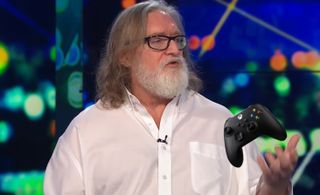Gabe Newell isn't losing sleep over Microsoft and Sony's big acquisition sprees
Valve's president predicts some of the current games industry consolidation will be "unwound" within a few years.

Microsoft's recent bid to acquire Activision Blizzard was huge news: a $68.7 billion shift for the games industry that's come on top of a string of other acquisitions, including Bethesda just last year. Sony has likewise been looking to bulk up its first party studios and acquired Bungie for $3.6 billion. While Sony and Microsoft continue to expand their domains, the PC remains an open middle ground where both publish their games. And so far, at least, the billions of dollars being thrown around to buy up studios hasn't enticed Valve, the biggest name in PC gaming, into doing the same.
"You know, consolidations a lot of times can be motivated by strange reasons," Valve president Gabe Newell said in a recent interview where we talked about the Steam Deck, the metaverse, and Steam's fraught history with Bitcoin.
"I've sat in boardrooms where people have talked about making decisions about an acquisition because they could fire a bunch of what are called G&A expenses. And it's like, really? That's what your strategy is? When you hear 'synergy,' what it really means is you're going to fire a bunch of middle managers who are overhead. Somebody whips out a spreadsheet… and [I'm] like, 'Yeah, but I don't think you understand how many of your core developers and engineers you're gonna lose because of the disruptions... you have this completely unrealistic view of what's gonna actually happen, that's motivating these decisions."
Newell said that there have been "waves of this forever" in and outside the games industry, pointing to the popularity of conglomerate mergers in the 1970s. He also said that many of them don't last, and it's true that in recent years some of the biggest conglomerates in the US have split into separate companies (or plan to), including General Electric and Johnson & Johnson.
Newell predicted that we'll see the same thing happen with some of the gaming industry's recent consolidation, and there's precedent there too—Bungie went independent from Microsoft in 2007, and more recently Hitman studio IO Interactive bought its freedom from publisher Square Enix in 2017.
"As a president myself, I understand why it's a lot of fun to be a mover and shaker and do these things, I just don't think that that's a good enough reason to actually make things better for customers," he said. "So I suspect some of these acquisitions will get unwound. And some of them will turn out to be successful. Because [in those cases] whoever is actually doing the acquisition has thought through how it's an additive thing. Not 'how did I make my empire bigger,' but: 'What's the opportunity to do a better job of building great game experiences for people?'"
Valve seems focused on growing Steam by itself—and expanding its footprint in PC gaming hardware with the Steam Deck. So far Valve has only acquired two companies in its history: 3D audio company Impulsonic in 2017 and Firewatch developer Campo Santo in 2018 (although like any company it has picked up individual talent, like it did when it acquired Kim Swift and the student game that eventually became Portal in 2005). Valve's most significant acquisitions have been of intellectual property rights for mods like Counter-Strike and Dota, which over time Valve turned into its most lucrative games.
The biggest gaming news, reviews and hardware deals
Keep up to date with the most important stories and the best deals, as picked by the PC Gamer team.
"I don't lie awake late at night saying 'What should we do? What's our competitive response?' for something like this, because it's sort of orthogonal to any of the things that we think are interesting in terms of how Valve runs its business," Newell said.

Wes has been covering games and hardware for more than 10 years, first at tech sites like The Wirecutter and Tested before joining the PC Gamer team in 2014. Wes plays a little bit of everything, but he'll always jump at the chance to cover emulation and Japanese games.
When he's not obsessively optimizing and re-optimizing a tangle of conveyor belts in Satisfactory (it's really becoming a problem), he's probably playing a 20-year-old Final Fantasy or some opaque ASCII roguelike. With a focus on writing and editing features, he seeks out personal stories and in-depth histories from the corners of PC gaming and its niche communities. 50% pizza by volume (deep dish, to be specific).
Most Popular






